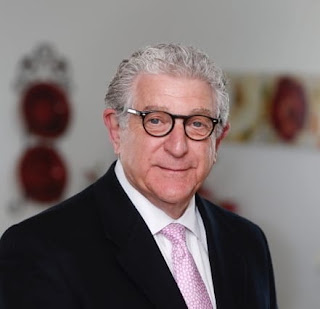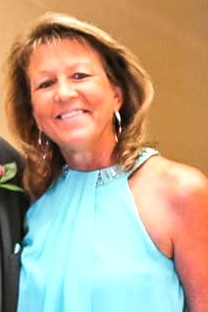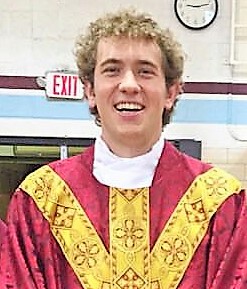George Ayoub
George Ayoub is a no-good, double-crossing traitor.
Just when we think we have him for good at GICC, Hastings College snaps him up. Of course they do. Why wouldn't they? You can hardly blame Hastings. After all, George could tell them thank you, but no thank you.
"My life's blood is at Central Catholic," he could say. He might mention all the good friends he's made - friends he'd never think of abandoning.
But no. He has to go and be an academic advisor at Hastings College. And that's because he's a no-good, double-crossing traitor.
The trouble is, as traitors go, he's a pretty stellar guy.
I become acquainted with George many years ago, but it's not until he invites me to join a talented little group of Grand Island writers that we become friends. For the past decade or so, we scribble stories and poems and essays and gather - sometimes sporadically - once a month to read our words aloud to each other. It's a daunting, soul-baring business made easier by George who guides the readings, offers kind advice, and somehow makes you feel that, gosh dang it, you must be some hell of a writer.
George himself is the author of two novels, wrote some 4000 columns for the Grand Island Independent during his long tenure at the paper, and still, at 71, is a prolific writer. His books are wonderful, of course, but his columns spoke to a community. I loved the ones about his colorful youth and family life with his "very wise wife" Jacalyn and all-star son Max. But he was never afraid to tackle difficult subjects. City and state politics filled up his column space, and sometimes George pondered the tragic events that tore us apart.
All these years later, I will never forget his column about Heather Guerrero, a 15-year-old western Nebraska paper girl, who was dragged from her paper route in the early morning hours and murdered just blocks from her home. That very same year, 2003, "Little Diana" Molina, a sweet and tiny two-year-old, was beaten to death by her father in Grand Island. Those two deaths haunted me. They haunted all of us.
George attended Diana's funeral and wrote later, "...her tiny battered body lay safe at last and swaddled in a lacy dress she should have worn to a cousin's quinceanera or her own third birthday party..."
The day after her death, George parked in front of the little girl's house trying to process the horrific events that had unfolded the night before and agonized for the words to comfort a grieving town.
He writes because, he says now, "I guess I've felt the need to be the voice for people who didn't have one."
As he was for teenager Heather Guerrero. And baby Diana Molina.
But he gave a community a voice, too. George's words helped all of us come to grips with our grief but at the same time galvanized us into action. George himself became part of a task force to prevent child abuse after Little Diana's death. In his eyes, that's part and parcel of what a good writer does. Before I knew him personally, I knew George through his column. All of Grand Island and much of Nebraska did, too. In George we discovered a friend who somehow understood and articulated our struggles.
For a long time, however, George had another career. He was a beloved English and journalism teacher at Grand Island Senior High, his alma mater, for seven years. He also taught for Doane College, and, somehow, he found time every spring and summer to help coach his son Max's Little League baseball teams.
Even though he's been retired from The Independent since 2015, he still teaches. And he spins. Did I mention spinning? Several mornings a week at some ungodly hour before dawn, he teaches a spin class to an intrepid class of vigorously fit and, in many cases, much younger bikers.
 |
| George as Ebenezer Scrooge |
It's my husband John who, four years ago, plants a bug in the ears of our school administrators.
"We need to hire George Ayoub at Central Catholic to teach religion," he says. As soon as he says it, I realize how right it is. At the gym, I run into George's wife Jacalyn and ask if she thinks George might be interested in the position.
Jacalyn is one of those people who makes lunch for the furnace repairman, transforms a bare wall into a thing of beauty, and could coax a smile out of Oscar the Grouch. But she pulls no punches when it comes to her husband of 50 years.
"George?" she laughs. "George can't teach religion!"
Even George has serious doubts.
"I'm not even a very good Catholic," he admits to my husband and me.
But he's wrong. He may question the Church, as he likes to say, and struggle with some of the doctrine, but he's a Catholic who finds comfort in some of the Church's rituals and certainly in its community. When he voices his doubts to GICC principal Kristen Klein and Chaplain Father Scott Harter, he's honest and forces them to understand that if they're looking for a Church doctrine teacher, he's not their guy.
They don't agree. He is their guy.
Our students think so, too.
In his unconventional fashion, George presents to our 12th grade students moral and ethical dilemmas. Allowing them to grapple with those dilemmas, he forces students to question the process in which they make moral and spiritual decisions. He also invites them to read and respond to meditations and to study prayer. Sometimes they drift into my English classroom still debating ethical arguments from religion class.
"Every topic we discussed was thought provoking and led us to think about what kind of people we really wanted to be," GICC senior Grace Herbek said. "Instead of relying on information we'd already been taught, Mr. Ayoub gave us opportunities to voice our opinions in a place where we weren't judged and to listen to our classmates' differing opinions, too. He was a one-of-kind teacher," she said. "He took the time to understand each individual, was open-minded, courteous, and just an incredibly like-able guy."
Senior Hayden Price agreed. "Mr. Ayoub's teaching style is unlike any I've ever experienced. His class is almost exclusively interactive. I loved how he stretched our minds with tough moral dilemmas - such as if stealing is ever right," Hayden said. "Without a doubt his class was one of the most interesting classes I had at GICC."
His own Catholic background, George admits, was "pretty much based on fear" but evolved into the notion of God as a loving father "who doesn't care what I say but only cares that I'm talking to him." It's a faith he hopes to instill in his students.
"I want their spiritual growth to have some ability to be practical," he says. And sometimes that ability to make a decision based on a certain set of principles, George says, should be a little uncomfortable.
He's leaving Central Catholic on a high note, that's for sure. George nurtured special bonds with GICC kids and especially this outgoing class of seniors.
"I loved the vibe of this group," he said. "They were really good kids. This school is a good place for them to learn to exercise their minds and spirits as they explore their faith."
And, boy, did the kids love him. They loved his "cool vests", they loved his "crinkly eyes because that's how you know he's a nice guy", and they loved it that George was really listening.
That's why we like him in our writers' group. George is listening to us.
It's what he'll do at Hastings College this coming fall as an academic advisor. George will assist students with academics, class projects, time management, a little counseling, and simply be there, he says, "as somebody to run ideas past."
He'll be great at it, too.
At 71 years of age, a brand new job doesn't phase him. He feels good but never takes life for granted.
"I was able to marry my best friend - I always say I married way above my station," he says, "and our son Max has been a gift. We've loved being parents."
All of life, he says, is a gift. It's what he writes to his students in graduation cards and yearbooks as they part ways: "May you live all the days of your life."It's a famous quote by Jonathan Swift, one George takes to heart. He's tried to live all the days of his life not as a spectator but as a curious person actively engaged in the good of others.
In the end, George Ayoub manages to make all of us feel important - whether we're aspiring writers, Little League baseball players, early morning spinners, Senior High Islanders, Central Catholic Crusaders, or, starting this August, a Hastings Bronco.
We love him for it.
But he's still a no-good, double-crossing traitor.





George was my homeroom, English, and US History teacher in 8th grade at a small catholic school in Los Angeles in 1985. Simply the best.
ReplyDelete